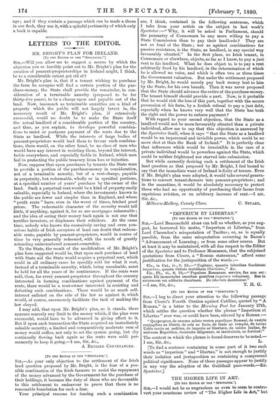LETTERS TO THE EDITOR.
MR. BRIGHT'S PLAN FOR IRELAND.
[To THE EDITOR OF THE "SPECTATOR.")
you allow me to suggest a means by which the objection you so forcibly point out to Mr. Bright's plan for the creation of peasant-proprietorships in Ireland might, I think, be to a considerable extent got rid of?
Mr. Bright's plan is, that if a tenant wishing to purchase the farm he occupies will find a certain portion of the pur- chase-money, the State shall provide the remainder, in con- sideration of a terminable annuity (proposed to be for thirty-five years), to be a charge upon and payable out of the land. Now, inasmuch as terminable annuities are a kind of property which the public will not largely invest in, the necessary result of Mr. Bright's plan, if extensively successful, would no doubt be to make the State itself the actual landlord of a considerable portion of the country, and thus, as you explain, to develope powerful combina- tions to resist or postpone payment of the rents due to the State as landlord. While the interests of large bodies of peasant-proprietors would lead them to favour such combina- tions, there would, on the other hand, be no class of men who would have any interest in resisting them, beyond the interest, feeble everywhere, and especially feeble in Ireland, which men feel in protecting the public treasury from loss or injustice.
Now, suppose that upon purchases by tenants the State were
to provide a portion of the purchase-money in consideration, not of a terminable annuity, but of a rent-charge, payable in perpetuity, but redeemable, wholly or in specified portions, at a specified number of years' purchase by the owner of the land. Such a perpetual rent would be a kind of property easily saleable, especially in Ireland, where the investments known to the public are fewer and simpler than in England, and where "profit rents" have, even in the worst of times, fetched good prices. The redeemable character of the security would tell little, if anything, against it, for so are mortgages redeemable ; and the idea of seeing their money back again is not one that terrifies investors, or displeases their solicitors. At the same time, nobody who knows the excessively saving and even pen- urious habits of Irish occupiers of land can doubt that redeem- able rents, payable by peasant-proprietors, would in course of time be very generally redeemed, with the result of greatly extending unincumbered peasant-ownership.
To the State, the result of the modification of Mr. Bright's plan here suggested would be, that upon each purchase of land with State aid the State would acquire a perpetual rent, which could in all ordinary cases be speedily sold for what it cost, instead of a terminable annuity, which, being unsaleable, must be held for all the years of its continuance. If the rents were sold, then, for every peasant-proprietor throughout the country interested in forming combinations against payment of the rents, there would be a rent-owner interested in resisting and defeating such combinations. There would be as much self- interest enlisted on the side of the law as against it, which would, of course, enormously facilitate the task of making the law obeyed. I may add, that upon Mr. Bright's plan, as it stands, there appears scarcely any limit to the money which, if the plan were successful, would have to be advanced in giving effect to it. But if upon each transaction the State acquired an immediately saleable security, a limited and comparatively moderate sum of money would suffice, not only to set the system going, but (by continually flowing back again as the rents were sold) per- manently to keep it going.—I am, Sir, &c., A RETIRED CONVEYANCER.


































 Previous page
Previous page